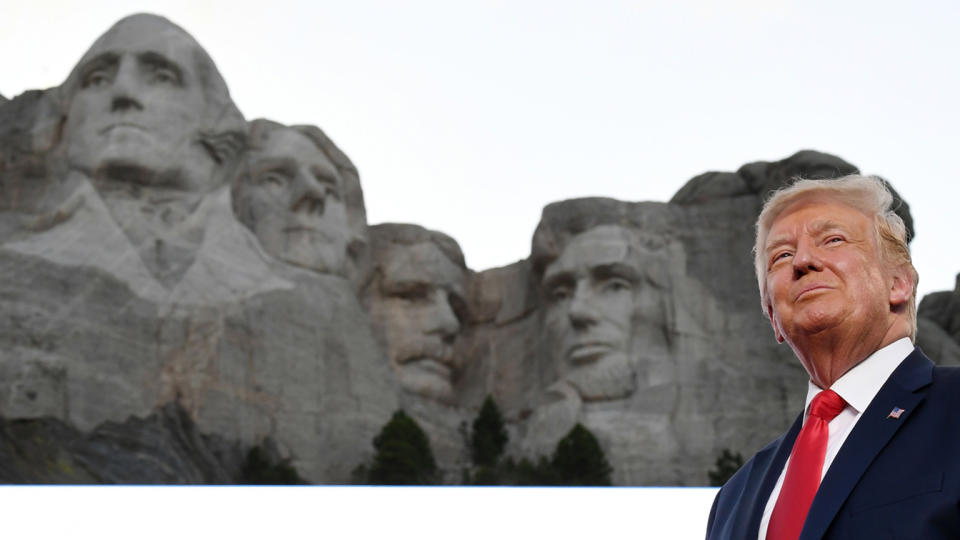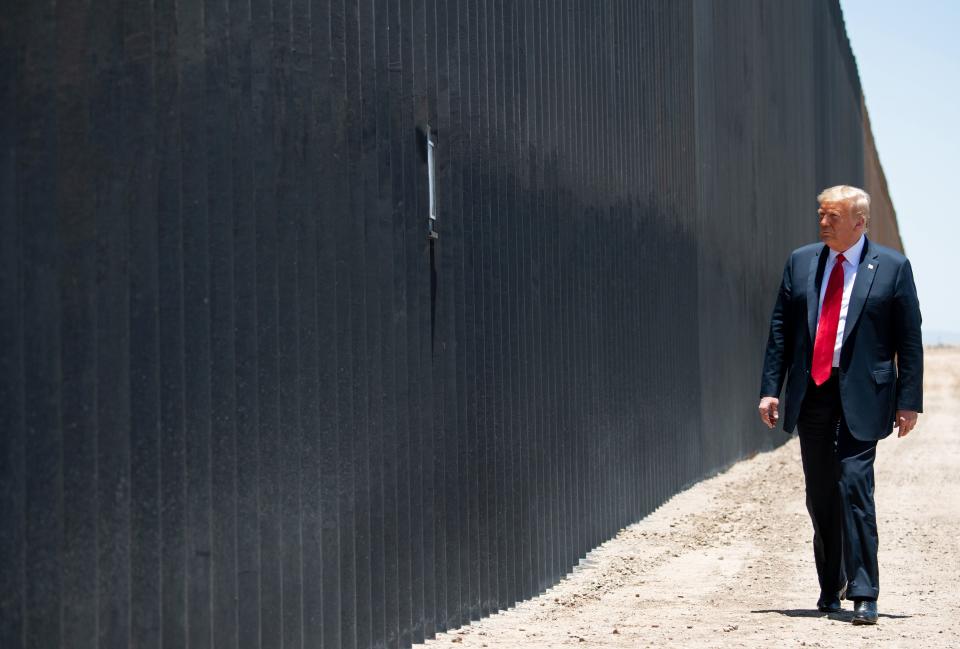How will history view Trump — and us?
Well before his term was over, Donald Trump was already musing about adding his face to Mount Rushmore, augmenting his list of honors both real (a star on the Hollywood Walk of Fame, two Emmy nominations, 30 Time magazine covers) and imaginary (Michigan’s “Man of the Year”). The New York Times reported that he had asked South Dakota Gov. Kristi Noem about the possibility, to which he responded with one of his characteristic, have-it-both-ways tweets: “Never suggested it although, based on all of the many things accomplished during the first 3 1/2 years, perhaps more than any other Presidency, sounds like a good idea to me!”
Being impeached and then denied a second term are poor recommendations for presidential immortality, and Trump is likely to go down in history more for his sullen, graceless exit than his accomplishments. A running theme during his tenure has been the way he undermined democracy with his baseless claims of election fraud, threatened the rule of law by threatening to arrest his rivals, cheapened the presidency with his crude tweets and clownish rallies, and used his hotels and resorts to loot the Treasury. His legacy will be a case study in how the long-standing norms of American democracy can be bent to accommodate the whims of an aspiring strongman with a major party and a national news network behind him.

Bent, but not broken. Overlooked in the headlong rush of news this week was that the machinery of democracy actually functioned. While the president blustered and TV anchors pontificated, unsung clerks in drab county offices worked long hours, at times under the hostile gaze of partisan observers, to sort and count more than 140 million ballots. A record number of citizens cast votes in the midst of a pandemic, and despite the panicked predictions from both sides of chaos and meddling — from foreign intelligence services, freelance hackers, corrupt software vendors, ballot-box-stuffing Democratic machines, vote-suppressing Republican legislatures — the president’s hysterical claims of fraud rang mostly hollow.
And having passed judgment on Trump’s four years in office, we can begin the essential work of imagining how history will look back on this period, on him, and on us. We elected him four years ago, with his grotesque character on full display: the greed, the bullying, the misogyny and flagrant sexual infidelity, the malignant narcissism that members of his inner circle have diagnosed in him. His own chief of staff, Gen. John Kelly, described him — after his firing — as “the most flawed person I have ever met in my life.” He will go down in history for his inability to even pretend empathy toward young children separated from their parents by his border policies, his bullying of the press whenever it reported something he didn’t like, his casual subversion of the justice system by issuing pardons to his allies while calling for the jailing of his opponents, his moral cowardice toward dictators. After four chaotic years, he still won more than 69 million votes on Nov. 3, around 6 million more than in 2016. His semiliterate tweets and ranting speeches filled with half-completed thoughts notwithstanding, he managed to connect with a near-majority of Americans on a visceral level that political scientists, pollsters and opinion writers will be dissecting and debating into the foreseeable future.
At the moment, of course, we are captive to the narrative imposed on the nation by the coronavirus pandemic. With our lives upended by a disease that by the end of his term will have led to the deaths of well more than a quarter-million Americans, we naturally judge the president by his handling of the pandemic, and the verdict on his stewardship is clear: It was a disaster characterized by wishful thinking; scientific illiteracy; and inconsistent, dishonest and reckless policymaking.

If the coronavirus turns into a world-historical calamity that alters the course of civilization, Trump’s promotion of hydroxychloroquine and his disdain for masks will eventually become footnotes. If it is controlled through some combination of science, good policy and luck, it will still have left an enduring mark on America and on Trump’s reputation, but it will eventually recede as a political issue. Trump’s prediction that the media would stop talking about COVID after the election (“That’s all I hear about now. … ‘COVID, COVID, COVID, COVID.’ By the way, on Nov. 4 you won’t hear about it anymore.”) was obtuse and perverse. His resentment over being cheated out of the chance to run on his pre-pandemic record on the economy by what amounts to an act of God is, at least, understandable.
But the thing about the pandemic was that it exposed precisely Trump’s most significant and consequential flaw, his refusal to acknowledge empirical facts that conflict with how he wants to see the world.
Trump’s political career was conceived in the fevered atmosphere of 1980s New York City, when he famously took out newspaper ads calling for the restoration of capital punishment in the aftermath of the Central Park Five case, in which minority teenagers were falsely convicted of the brutal rape of a young, female jogger. As recently as last year, long after the youths were exonerated and released, Trump as president refused to retract or apologize for his remarks, callously insisting that “you have people on both sides of that.” His rhetorical style was forged in the reality-warping force field of right-wing talk radio, which fed his cynical promotion of birtherism — the belief, based on nothing, that Barack Obama was born in Africa. He came into office blaring his frenzied, and easily disproved, insistence that his inauguration crowd was larger than Obama’s, a belief based on less than nothing.
Trump’s previous career as a New York City real estate developer, it turns out, was perfect preparation for how he ran for office and governed. In the world of luxury condominium marketing, the lobby will always be done in two weeks, like the COVID-19 vaccine or the health care plans Trump has been promising since June. “We’re signing a health care plan within two weeks, a full and complete health care plan,” Trump told Fox News’ Chris Wallace in an interview — three and a half months ago. He even acknowledged his use of this tactic in “The Art of the Deal,” calling it “truthful hyperbole,” an oxymoron that turns meaning inside out. His second career, of course, was the host of a so-called “reality” television show, which bore the same relationship to reality as “John Madden Football” does to the NFL.

A clear distillation of Trump’s mindset was Sharpiegate, the micro-scandal around his refusal over several days in 2019 to admit or correct his error in naming Alabama among the states in danger from Hurricane Dorian. Not only did the White House pressure government meteorologists to change their forecast to agree with this misstatement, Trump went on television himself to defend it. He brandished a printout of an official map that had been altered by a line drawn with a thick, black marker, like the ones he uses for his signature, a way of flaunting his cynical indifference to whether anyone actually believed him. The term “Orwellian” gets thrown around a lot, but as an assertion of raw power over the minds of his supporters, that is about as clear an example as you could find.
It was a paradigm for his administration’s approach to everything, or at least anything that mattered. Climate change is a reality Trump wishes not to confront, so he throws out nonsense about windmills causing cancer, an assertion so ludicrous and irrelevant it doesn’t even amount to an argument. He doesn’t want to admit that Americans are still dying of COVID-19, so he invents a claim that doctors are inflating the mortality figures because they get paid more that way. In lieu of a health care plan to replace the Affordable Care Act, he signs a meaningless “proclamation” that preexisting conditions shall be covered by health insurance, the equivalent of saying “the lobby is finished” before it’s even painted.
Some of the damage Trump has done to American democracy may prove self-correcting. After the last four years, it now seems unlikely the United States will elect another president who runs an international chain of golf courses. Falling in “love” at a summit with North Korean dictator Kim Jong Un was an idiosyncrasy on Trump’s part, not a policy that future presidents will be bound by. Returning the U.S. to the Paris climate agreement or signing a bill to reverse his 2017 tax cuts can be done with the stroke of a pen.

In other respects, the political currents Trump stirred up will be swirling for a long time after he leaves office. His impulse toward authoritarianism revealed how dependent American democracy is on norms of behavior that can be bent by a determined president with a cowed party behind him. He weaponized nationalism as a political force, even as he cheapened it with tacky stunts like hugging and kissing the American flag. He mobilized the economic grievances of workers in declining industries with promises that economists knew would be difficult or impossible to keep; after years of boasting about “ending the war on beautiful, clean coal,” employment in the coal industry, which stood at approximately 50,400 jobs when he was elected, was at exactly the same level this past February. He took advantage of the resentments of evangelicals over American society’s secular drift, enflaming them into an absurd “culture war” over department store store clerks saying “Happy Holidays” instead of “Merry Christmas.”
But Trump’s habitual dismissal of logic and standards of proof may, in the long run, prove more consequential. It gives his imprimatur to what was already a dangerous trend in the country at large. Almost every significant event in American life over the last half century — the moon landing, the 9/11 attacks, assassinations and mass shooting events — gives birth to a cadre of “truthers” who construct their own narratives around it, and Trump has been an eager participant wherever he sees some advantage for himself — notably in fostering the destructive idea that Democrats will steal the election with fraudulent mail-in votes. “This is going to be a fraud like you’ve never seen,” he warned darkly in his first debate with Joe Biden.
A PBS “Frontline” documentary shows how Trump echoed radio host Alex Jones’s rants about Obama “founding” ISIS, Sen. Ted Cruz’s father conspiring in the assassination of John F. Kennedy, Hillary Clinton masquerading as a human but actually “an abject psychopathic demon from hell,” which Trump, perhaps showing off for his evangelical base, repeated as literal fact. “Your reputation is amazing,” Trump told Jones during a call-in to his show in late 2015. “I will not let you down.”

So now, encouraged by presidential retweets, winks and nods, many millions of Americans have fallen under the sway of a myth about “global elites” who keep children as sex slaves, spinning off corollary conspiracy theories about vaccines, ballot fraud and other favorite Trumpian obsessions. Putting that genie back in the somewhat narrow-necked bottle of Americans’ common sense will be the work of years.
Trump’s border wall with Mexico, if it’s ever completed, can be torn down, if it doesn’t fall down on its own. But mental walls against unwelcome facts — “defense mechanisms” in the language of psychology — can be harder to dislodge. If that indeed is Trump’s legacy, it’s one we will be coping with for a long time.
And it’s certainly no argument for putting him on Mount Rushmore.
_____
Read more from Yahoo News:



